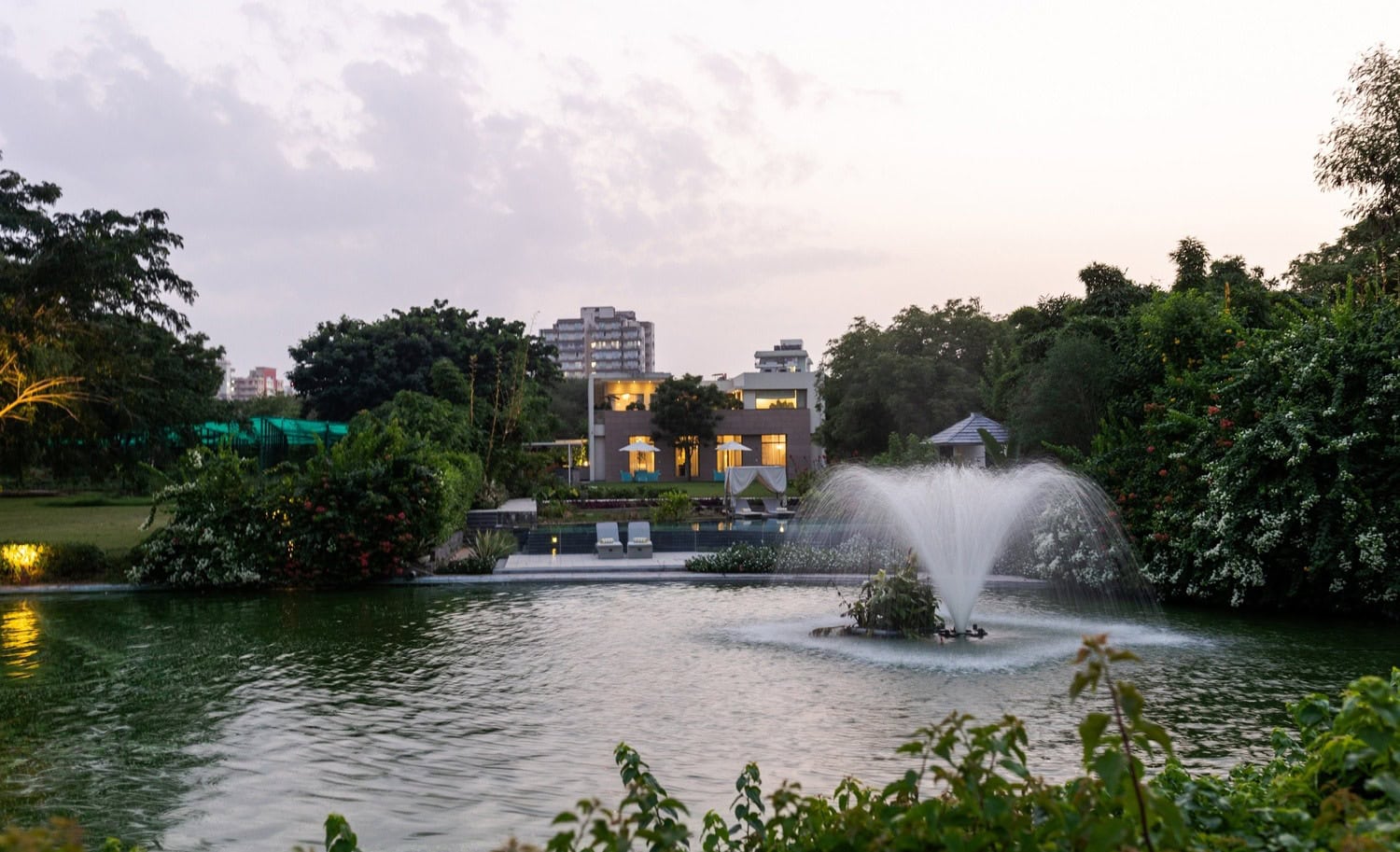In an exclusive interview with Arjun Gill, Editor, Today’s Traveller, Ashwani Khurana, Founder & CEO, Karma Lakelands talks about the inspiration behind the creation of Karma Lakelands.
At Karma Lakelands, sustainability isn’t just a principle—it’s a way of life. Inspired by a deep connection with nature and the creative ingenuity of Padma Shree Awardee Nek Chand, the Founder envisioned a harmonious blend of luxury and eco-consciousness. From utilizing renewable energy and organic farming to achieving significant milestones like a 30% carbon sink with over 200,000 trees, Karma Lakelands stands as a testament to how environmental stewardship can redefine hospitality. Through innovative practices and a commitment to community engagement, the property inspires a greener future while delivering an unparalleled luxury experience.

TT Bureau: What inspired the sustainability initiatives at Karma Lakelands, and what drove you to incorporate these principles into the property’s development?
Ashwani Khurana: My inspiration for Karma Lakelands’ sustainability initiatives comes from a deep connection with nature. I was fortunate to befriend Padma Shree Awardee Nek Chand, whose passion for creating art from discarded materials ignited my own love for the environment. Inspired by his work, I started to develop a keen interest in tree planting, and over the years, this interest evolved into a passion for promoting responsible environmental practices.
I believe that we have a responsibility to preserve our planet, and Karma Lakelands is a testament to this belief. From water conservation to organic farming, every aspect of the property is designed to minimize our impact on the environment. I hope that Karma Lakelands serves as an example of how luxury and sustainability can coexist, inspiring others to embrace eco-friendly practices.
TT Bureau: In what ways does Karma Lakelands maintain a luxurious hospitality experience while upholding its commitment to environmental sustainability?
Ashwani Khurana: We strive to create a luxurious experience at Karma Lakelands while respecting the environment. We achieve this by combining high-end amenities with sustainable practices. For instance, we utilize renewable energy sources to power the property, and we harvest rainwater to conserve water resources. We also practice organic farming to reduce the use of harmful chemicals and promote biodiversity. By implementing these eco-friendly initiatives, we ensure that our guests can enjoy a luxurious stay without compromising the environment.

TT Bureau: What obstacles have you encountered in implementing these sustainable practices within the hospitality sector?
Ashwani Khurana: Implementing sustainable practices in the hospitality industry is not without its challenges. One significant hurdle is overcoming resistance to change, as many traditional practices are deeply ingrained. Additionally, training staff to adopt new, eco-friendly methods can be time-consuming and resource-intensive.
Balancing luxury with sustainability is another complex task. Guests expect a high level of comfort and convenience, which can sometimes conflict with environmental goals. Sourcing sustainable products can be difficult and often more expensive than conventional alternatives. Despite these challenges, we remain committed to finding innovative solutions to create a more sustainable future for the hospitality industry.
TT Bureau: How do you assess the effectiveness and impact of your sustainability initiatives at Karma Lakelands?
Ashwani Khurana: We measure the effectiveness of our sustainability initiatives by tracking waste reduction and recycling efforts. We aim to divert as much waste as possible from landfills through recycling and composting, with a focus on reducing single-use products. To ensure guest and employee engagement, we collect feedback and monitor participation in eco-friendly programs. We also provide regular training to our staff to align their practices with our sustainability goals.
In addition, we conducted a comprehensive carbon footprint assessment for the past five years, aligning with the Paris Agreement and national net-zero goals. Led by experts from TERI School of Advanced Studies, we unveiled the “Karma Lakelands: Accelerating Net Zero Pathways and Sustainability” report during the “Future Green Leaders Meet-2024” on September 27, 2024.
Key milestones in our sustainability journey include meeting 20% of our energy needs through solar power, establishing a 30% carbon sink with over 200,000 trees, and improving soil carbon sequestration. These initiatives have not only positively impacted the environment but have also contributed to a 59% revenue increase. Looking ahead, we plan to further expand our solar capacity, enhance energy efficiency, increase forest cover, and promote community engagement to achieve our net-zero emissions goal.
TT Bureau: What insights can you share with other luxury hotels or businesses seeking to adopt sustainable practices without sacrificing quality?
Ashwani Khurana: To successfully implement sustainable practices without compromising luxury, it’s essential to focus on energy efficiency and waste reduction. This can be achieved through initiatives like energy-efficient lighting, zero-waste policies, and the reduction of single-use plastics. Educating guests about eco-conscious practices is crucial. By discreetly incorporating green technologies and providing informative materials, we can encourage guests to participate in sustainable efforts.
Collaborating with like-minded suppliers and maintaining transparency in sustainability efforts can further enhance our impact. Engaging staff in our vision is also vital, as they play a key role in implementing and promoting sustainable practices. By adopting a long-term perspective on sustainability, we can view it as an investment rather than a cost. This approach allows for innovation and the development of luxury experiences that align with our environmental and social commitments.
Ultimately, our goal is to minimize our environmental footprint while providing our guests with a peaceful and rejuvenating experience.
TT Bureau: How do you educate and engage your staff on sustainability practices to ensure that everyone is aligned with the property’s goals?
Ashwani Khurana: At Karma Lakelands, we take a comprehensive approach to educating and engaging our staff in sustainability practices to align with the property’s goals. Moreover, leadership plays a crucial role in setting the tone.
We conduct regular workshops and training sessions to educate staff on sustainable practices, such as water conservation, energy efficiency, waste management, and eco-friendly hospitality. We share the property’s sustainability goals and updates with all team members through meetings, newsletters, and notice boards. This ensures transparency and reinforces the importance of their contributions.
To keep staff motivated, we recognize and reward employees who excel at adopting sustainable practices. This fosters a sense of pride and commitment.
TT Bureau: How do you think the hospitality industry as a whole can further embrace sustainability, and what trends do you foresee shaping its future?
Ashwani Khurana: The hospitality industry can further embrace sustainability by prioritizing energy efficiency, reducing waste, and sourcing locally. By implementing innovative technologies like renewable energy sources and water conservation systems, hotels can significantly reduce their carbon footprint. Additionally, by offering guests eco-friendly options like reusable amenities and plant-based menus, hotels can promote sustainable choices. As technology advances, we can expect to see more sophisticated solutions for energy management, waste reduction, and sustainable building design. Additionally, there will be a growing emphasis on local sourcing, farm-to-table dining, and regenerative tourism practices.
TT Bureau: What personal experiences or values have influenced your commitment to sustainability in the hospitality sector?
Ashwani Khurana: My personal experiences and values have deeply influenced my commitment to sustainability in the hospitality sector. Growing up in a challenging environment, I learned the importance of resilience and the power of overcoming adversity. This experience instilled in me a strong work ethic and a determination to succeed.
Furthermore, my early exposure to the negative impacts of consumerism and waste inspired me to adopt a more sustainable lifestyle. I realized that our actions have a significant impact on the environment and that it is our responsibility to minimize our ecological footprint. This realization led me to incorporate sustainable practices into my business ventures, including the development of Karma Lakelands.
Read more – Today’s Traveller Interviews




1 Comment